CUSTOMARY LAW
Traditional and Khoi-San Leadership Act challenged in Constitutional Court
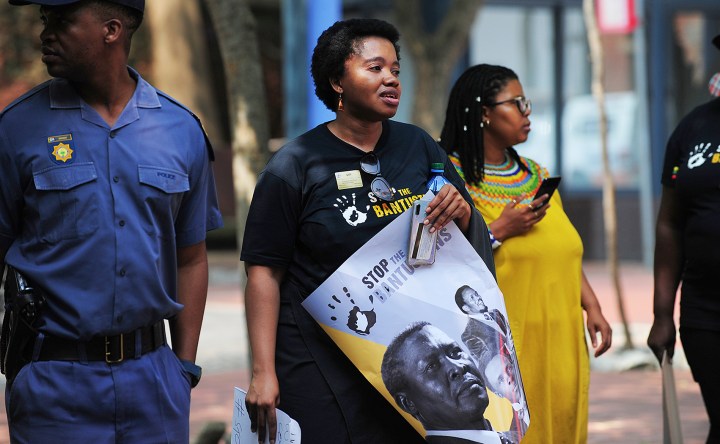
The Constitutional Court has heard arguments regarding the public participation process before the passing of the contentious Traditional and Khoi-San Leadership Act. Activists argued that there was an abject failure to ensure their voices were heard.
‘This case is about the requirements of participatory democracy for about 20 million South Africans who, for the most part, live far from the centres of power. For the most part, they live in rural areas. For the most part, they live in the poorest areas of our country, and for the most part, they have the least access to wealth, power and influence,” Geoff Budlender SC told the Constitutional Court on Thursday.
He was speaking as oral arguments were heard in the matter of Constance Mogale and Others v Speaker of the National Assembly and Others. In the case, rural citizens and civil society groups challenged the constitutional validity of the Traditional and Khoi-San Leadership Act (TKLA) that President Cyril Ramaphosa signed into law in 2019.
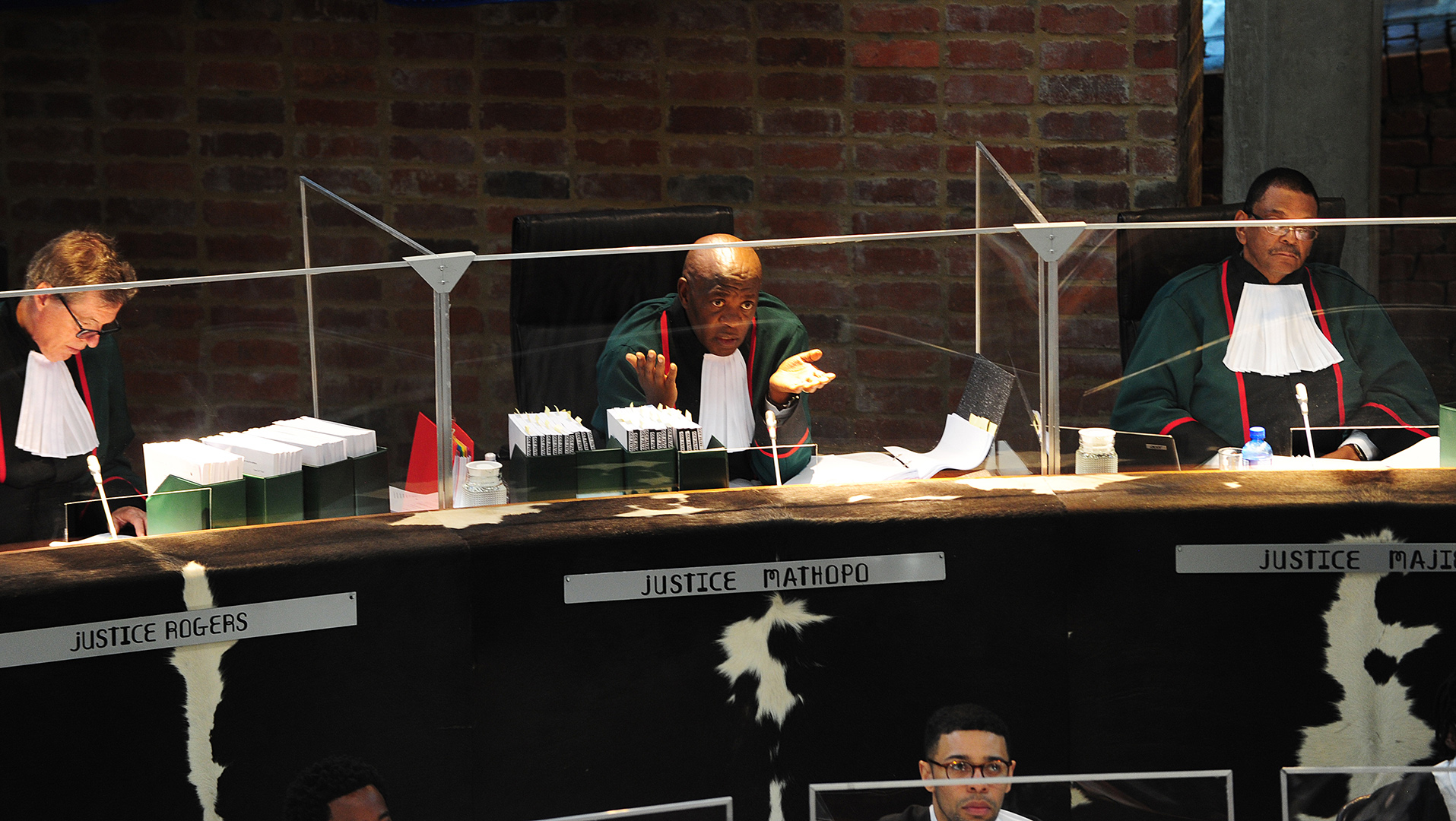
Justice Rammaka Mathopo (centre) speaks during the oral arguments in the Constitutional Court about whether the processes and public participation conducted by Parliament to pass the Traditional and Khoi-San Leadership Act 3 of 2019 was adequate in terms of the Constitution. (Photo: Leon Sadiki)
The history of the TKLA
The TKLA was introduced to Parliament in 2015, with the promise to recognise the Khoi-San people and their leaders, a move that was widely supported.
However, it drew criticism from civil society organisations, women’s groups and opposition parties, for various reasons, including that the law enables dispossession without consent, entrenches the boundaries of the old Bantustans and unconstitutionally strengthens traditional councils.
From 2016 to 2018, a public participation process was conducted by the National Assembly and provincial legislatures to gather feedback on the proposed law.
The Alliance for Rural Democracy (ARD), which initiated the Stop the Bantustan Bills Campaign in 2018, claims that the public participation processes were marred with issues. These include the late announcements of hearings, last-minute venue changes, hearing venues being far from rural communities, no copies of the bill at many hearings, the bill being available in English only, the bill being advertised as only affecting Khoi-San communities, and the voices of traditional leaders dominating some hearings.
Visit Daily Maverick’s home page for more news, analysis and investigations
Despite warnings by some civil society groups, Ramaphosa signed the contentious bill into law in November 2019, and the act then came into effect on 1 April 2021.
The bill replaces previous laws like the Traditional Leadership and Governance Framework Act of 2003 and is now the main statute regulating traditional leadership. Those challenging the law in court argue that the constitutional and customary rights of rural citizens are in danger under the TKLA.
The positives of the TKLA
Similar to its predecessor, the TKLA recognises the traditional institutions, communities and customs that are a significant part of the identity of millions of South Africans.
The TKLA also provides overdue recognition of Khoi and San heritage, communities and leaders, something numerous activists, including the applicant in the case, Constance Mogale, have voiced their support for.
Last, the TKLA also recognises and provides the regulation of traditional leadership and it recognises customary law which is an important part of the identity of rural citizens.
The negatives of the TKLA
The TKLA has been criticised for keeping in place apartheid boundaries and locking traditional communities into those jurisdictions.
The bill authorises traditional leaders to enter into investment deals with third parties without the consent of the people whose land rights stand to be dispossessed, said Tshepo Fokane from ARD.
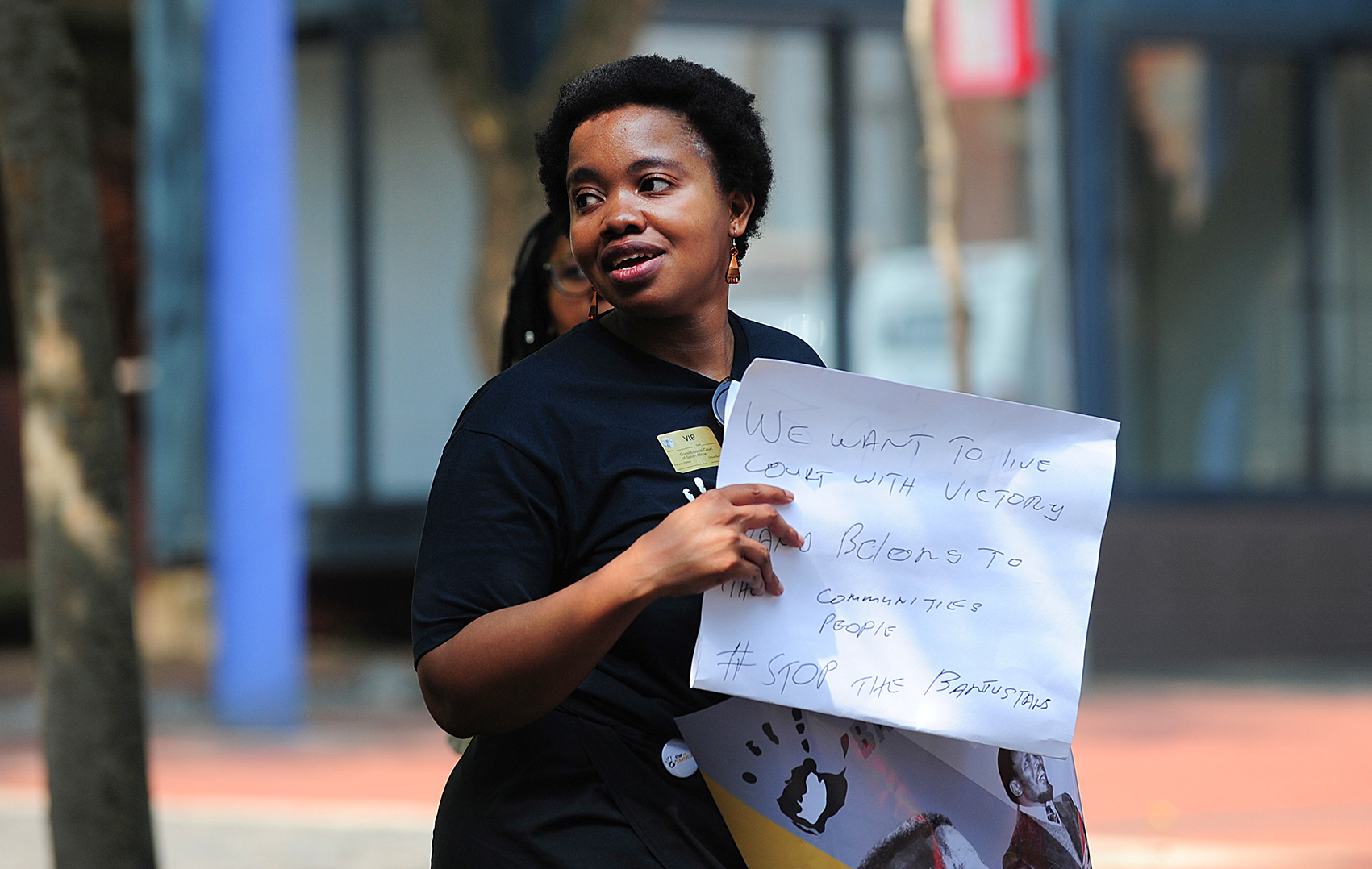
Alliance for Rural Democracy’s Tshepo Fokane outside the Constitutional Court in Johannesburg. (Photo: Leon Sadiki)
“Communit[ies] can be consulted, but the right to consent they are deprived of, so even if you say, no, that deal can still be enforced and in actual fact we have seen this happening all over the country prior to this law,” she explained.
This puts the land rights of communities and individuals at risk, as a traditional council can sign a mining or development deal without the express permission of land rights holders. The bill also fails to include any process of expropriation or compensation for people who may lose their homes and livelihoods as a result of decisions made by traditional leaders.
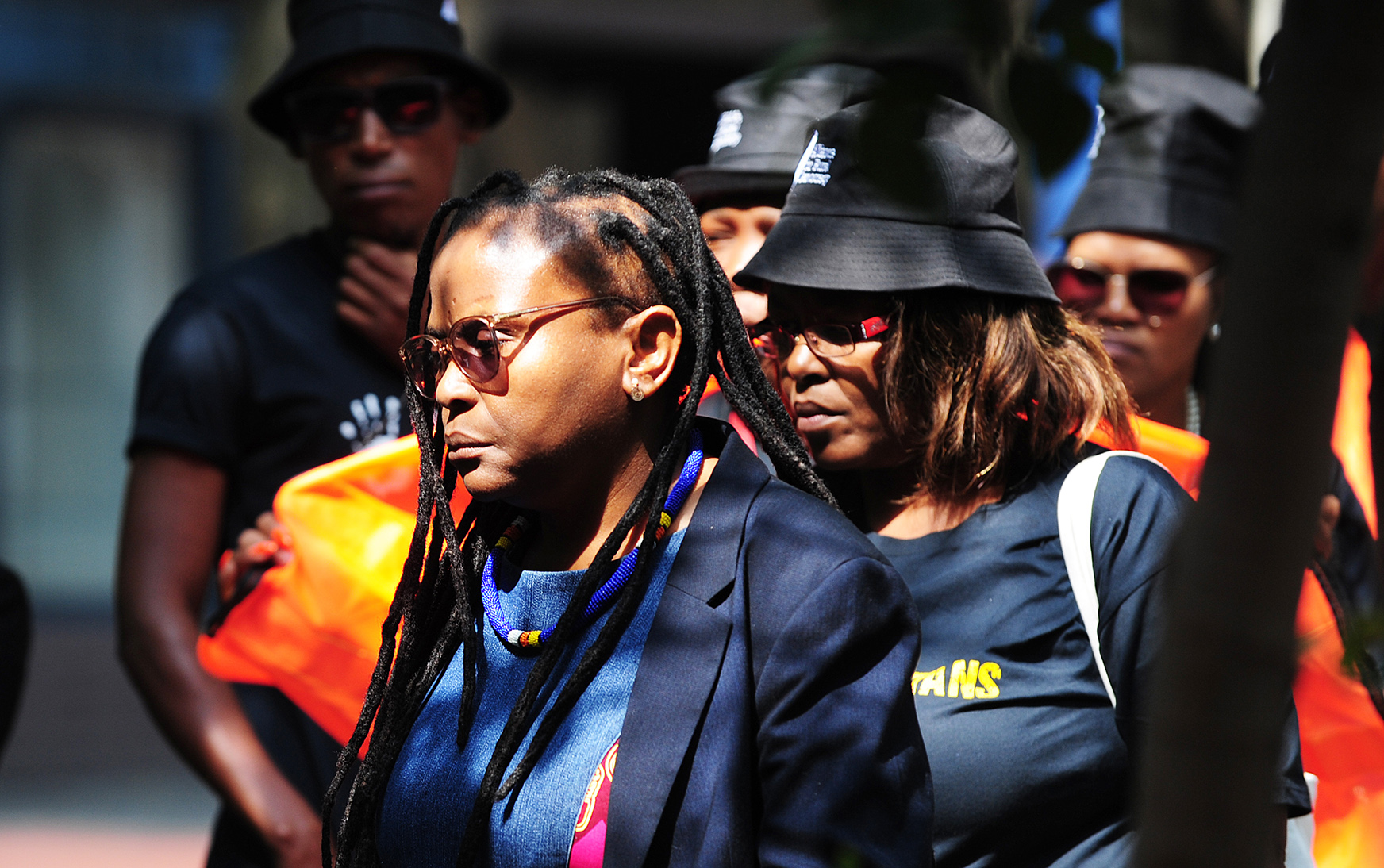
Alliance for Rural Democracy’s Constance Mogale outside the Constitutional Court in Johannesburg. (Photo: Leon Sadiki)
Constance Mogale, the national coordinator for ARD, said they view this hearing as highly important.
“We see it as a repetition of the 1951 Bantu Authorities Act, where Bantustans were created,” she said.
Traditional leaders would be appointed by the President and not by the royal family or by the communities, she explained.
“This bill also gives the President power to withdraw that recognition, which means if the traditional leader is loyal to their people and says no to the big deals, his recognition can be withdrawn,” she said.
The argument
Mogale is the main applicant in the Constitutional Court case and will be joined by co-applicants, the Land Access Movement of South Africa, Mashona Wetu Dlamini, a member of the Umgungundlovu community in Xolobeni, Eastern Cape, and Victor Modimakwane, a member of the Bakgatla ba Kgafela community in North West.
They argue that rural citizens were not allowed to participate effectively in the public participation process conducted by Parliament before passing the TKLA. In addition, they contend that the TKLA undermines the very values that the Constitution is based on, which are also found in customary law. These values are democracy, accountability and freedom.
The TKLA also threatens community rights to property, equality, freedom of association, administrative justice and the right to public and political participation.
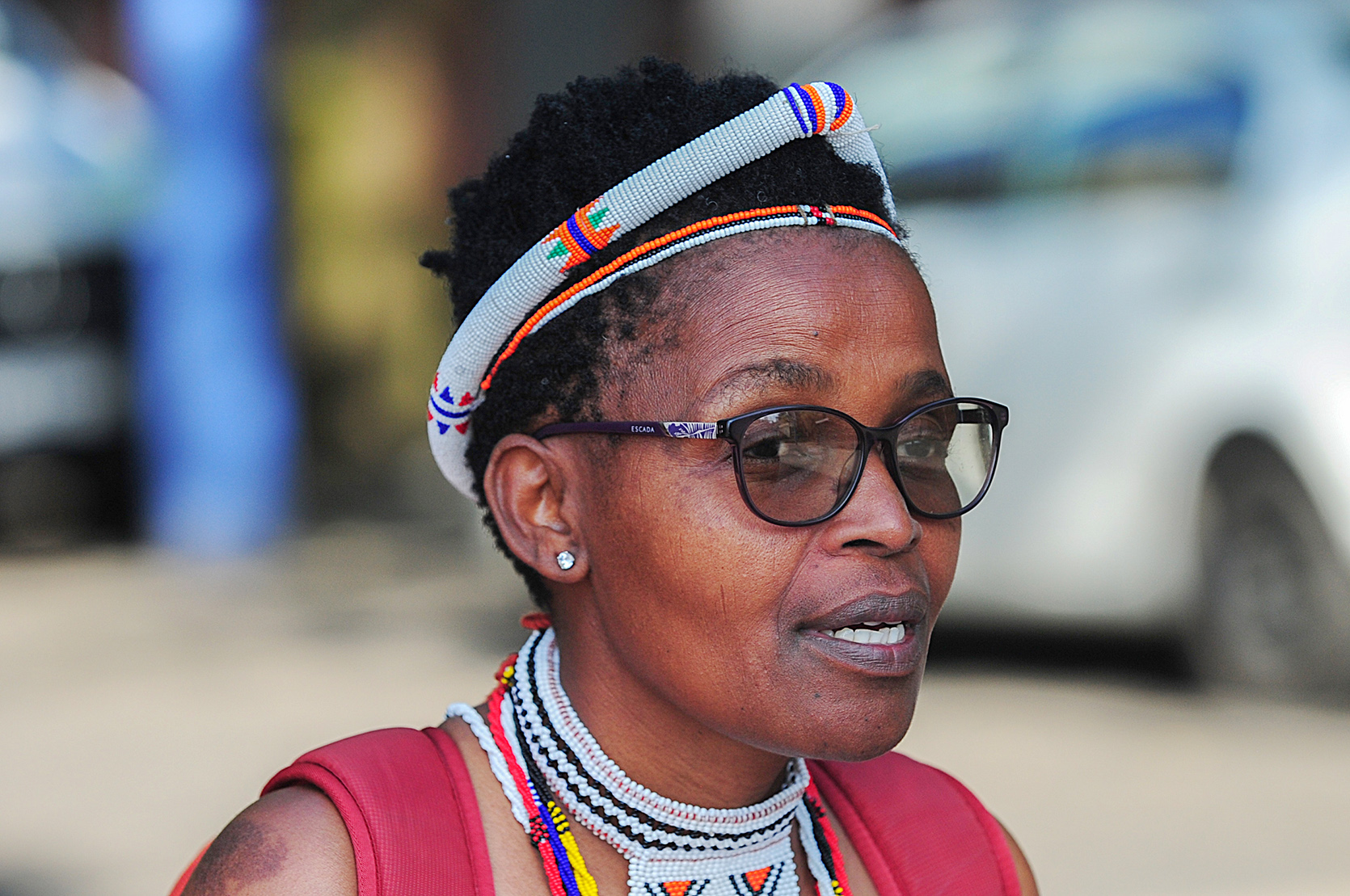
Activist Nonhle Mbuthuma outside the Constitutional Court in Johannesburg. (Photo: Leon Sadiki)
The importance for rural citizens to partake in participatory democracy cannot be understated, as this law governs virtually every aspect of their daily lives, said Budlender.
“It governs their access to land, basic services and governs their rights to benefits of the land where they live and have lived for generations,” he explained.
Budlender criticised the public participation process, describing it as fundamentally flawed and ineffective. There were late announcements of hearings, last-minute venue changes, no copies of the bill at many of the hearings, and when community members did have the opportunity to speak, their comments were not recorded in Parliament’s reports.
The applicants cannot be criticised for not participating in the process, as this was not because of a lack of effort, he said.
“The applicants could never be described as people who didn’t show any interest in the duty to facilitate public involvement, as they organised and mobilised across the country in an attempt to ensure that the public voice of the affected communities was heard,” he said.
The counterargument
Appearing on behalf of the Speaker of the National Assembly, Nazeer Cassim SC argued that the applicants had no standing and delayed too long in bringing the challenge. He also argued that the TKLA was an inclusive piece of legislation that recognised the Khoi and San people.
“It says to provide for the recognition of traditional and Khoi-San communities, and what they [the applicants] are asking the court is to set this act aside… and let’s go back to old apartheid legislation and it is bizarre what they are asking for,” he said.
Cassim also argued that there was nothing in the TKLA about depriving land rights. “It is merely emotional talking,” he said.
If the applicants were successful, third parties would be affected.
“On 19 August 2021, the President recognised Mr Jonguxolo Sandile as the King of AmaRharhabe Kingship, so now they want the court to set it aside. Mr Sandile will say that nobody heard me; I did not join as a party and my rights are affected,” he said.
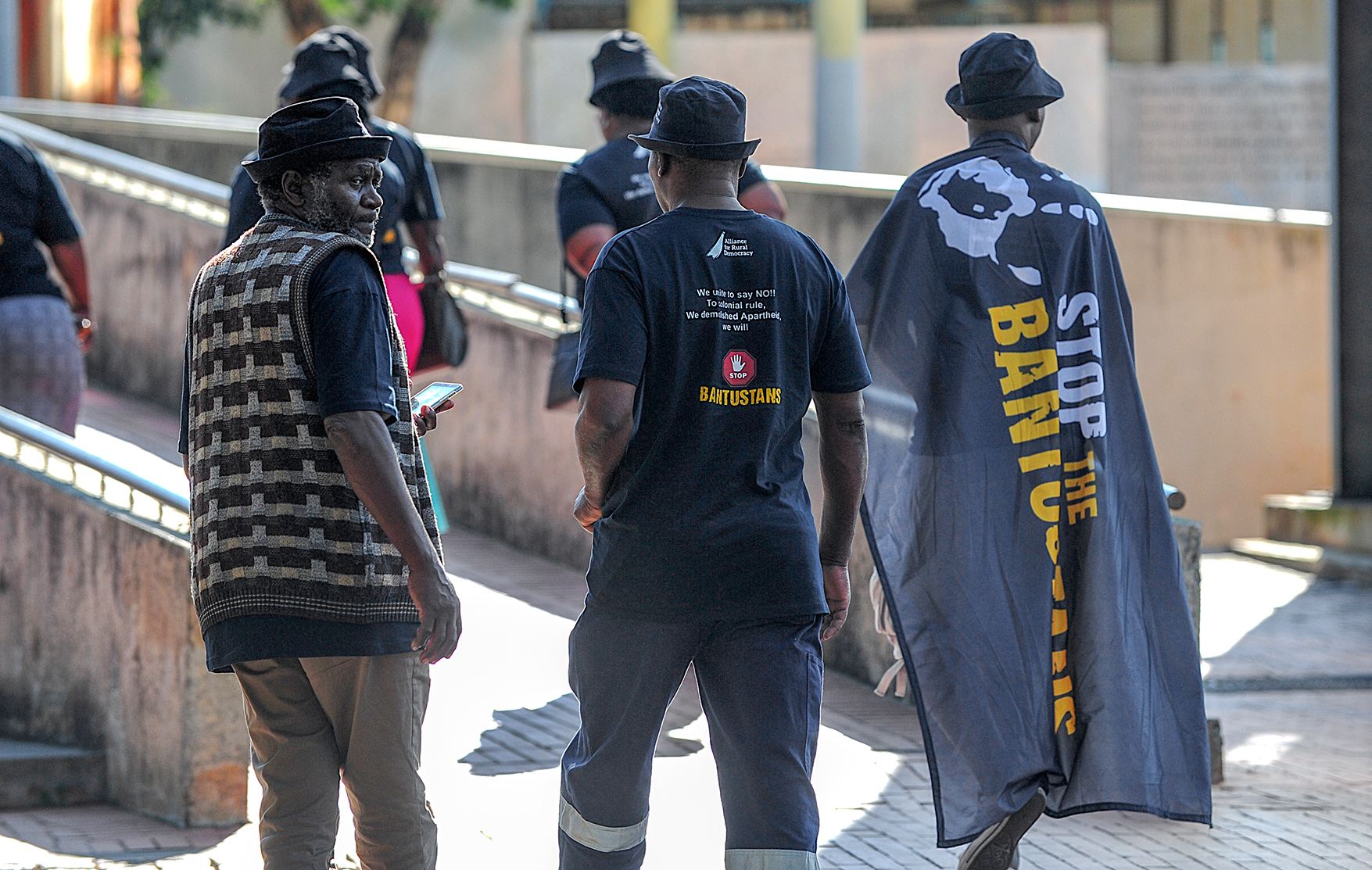
The Stopbantustans group outside the Constitutional Court in Johannesburg. (Photo: Leon Sadiki)
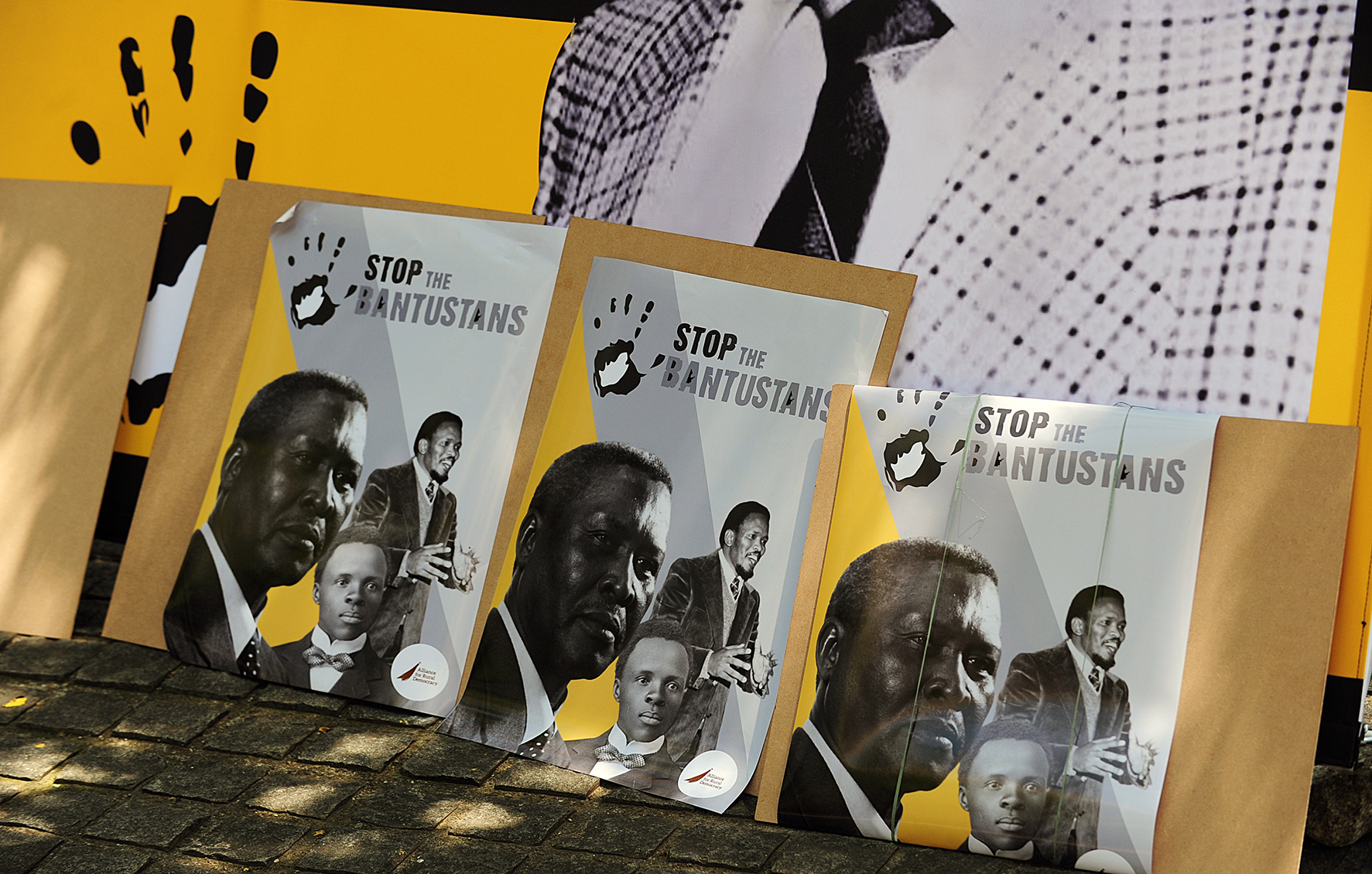
Stopbantustans posters outside the Constitutional Court in Johannesburg. (Photo: Leon Sadiki)
Cassim maintained there was public participation and that the applicants had no real complaint. Justice Leona Theron noted that Cassim had offered no response to the applicants’ case that the hearings in Gauteng and North West were flawed.
“If we take just those two provinces, if we accept there is nothing to challenge the applicants’ case in respect of those two provinces, must this court then not conclude that overall the hearings were flawed?”
When asked by Justice Jody Kollapen about the factual shortcomings in the public participation process, Cassim said perhaps the public was not as keen to get involved in the process.
Justice Theron explained that Parliament had set its own standards for public participation, and one of those was that invitations had to be sent out five weeks before the hearing. She questioned if Parliament complied with its own guidelines regarding public participation, and Cassim conceded that it had not.
Cassim drew laughs from the court when he said that how the government regulated how it would function was not how it actually functioned.
“Government is overambitious in its own aspirations, and every day they just don’t deliver,” he explained.
Justice Theron also asked if the onus should be placed on the applicants or on Parliament regarding the improper record-keeping of the public participation process. Cassim conceded that the onus was on Parliament.
A continuation of a lifelong struggle
In the application, Mogale explained that she grew up in Ramatlabama near Mafikeng, an area densely settled by African families who had countered dispossession by buying and establishing rights on land they had acquired in defiance of the laws of the former Boer Republic and apartheid.
These families were able to establish dignified and thriving homes against all odds, investing heavily in the education of their children at local schools and nearby mission schools.
“I am fortunate to come from a tradition of strong and resilient families who can trace our histories and land rights back on both the maternal and paternal sides,” she added.

Constitutional Court during the oral arguments about whether the processes and public participation conducted by Parliament to pass the Traditional and Khoi-San Leadership Act 3 of 2019 was adequate in terms of the Constitution. (Photo: Leon Sadiki)
Mogale also explained that the apartheid government embarked on a process of destruction and forced removals to accommodate white interests due to the mineral and agricultural wealth of the Western Transvaal maize belt.
The process of challenging forced removals had been a central part of Mogale’s life. As a young schoolgirl, she took minutes for the land-claiming committee and was heavily involved in the process of reoccupying and rebuilding Goedgevonden in many ways.
Mogale was inspired by brave community leaders and recalled the ambivalent role adopted by many traditional leaders or chiefs of the Western Transvaal in those days.
“Many of them cooperated with the policy of forced removals and became part of the Bophuthatswana government,” she said.
She said the current TKLA litigation was a continuation of her lifelong struggle for the preservation of the African ideals and realities of land rights, dignity and accountability.
“To abandon these struggles for land and democracy is to abandon my own self. These ideals, traditions and rights have sustained my family and my community and are part of our legitimate customary law. They have made me who I am,” she said.
Judgment was reserved. DM/MC





















 Become an Insider
Become an Insider
Comments - Please login in order to comment.